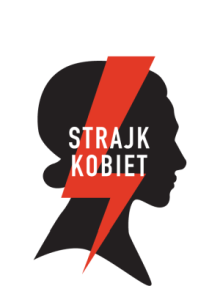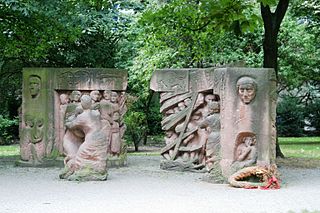 W
WThe 2020–2021 Women Strike protests in Poland commonly called the Women Strike, were anti-government demonstrations and protests in Poland that began on 22 October 2020, in reaction to a ruling of the Constitutional Tribunal, mainly consisting of judges who were appointed by the ruling Law and Justice dominated United Right, which tightened the law on abortion in Poland. The ruling made almost all cases of abortion illegal, including those cases in which the foetus had a severe and permanent disability, or an incurable and life-threatening disease.
 W
WThe All-Poland Women's Strike, is a women's rights social movement in Poland, established in September 2016. It was set up in protest against the rejection by the Sejm of the Polish Parliament of the bill "Save Women", which was considered by the Sejm in parallel to the project "Stop Abortion". The movement was responsible for the organization of Black Monday, a protest action that took place simultaneously in 147 Polish cities, towns and villages.
 W
WThe International Women's Strike, also known as Paro Internacional de Mujeres, was a global movement coordinated across over 50 countries and coinciding with International Women's Day, on 8 March 2017 and 2018. The United Nations announced the theme of "Women in the Changing World of Work: Planet 50-50 by 2030", calling for gender equality around the globe. In the United States, the strike was branded as "Day Without a Woman".
 W
WThe Rosenstrasse protest on Rosenstraße in Berlin took place during February and March 1943. This demonstration was initiated and sustained by the non-Jewish wives and relatives of Jewish men and mischling who had been arrested and targeted for deportation, based on the racial policy of Nazi Germany. The protests, which occurred over the course of seven days, continued until the men being held were released. The Rosenstrasse protest is considered to be a significant event in German history as it is the only mass public demonstration by Germans in the Third Reich against the deportation of Jews. In describing the protests, German Foreign Minister Joschka Fischer states, "There were demonstrations, public protests against random arrests, - first dozens, then hundreds, then thousands of women, who demanded in unison "Give us back our men!" This lasted a whole week, in icy weather, in the middle of Berlin in 1943. Finally the protest by the women of the Rosenstrasse, furiously desperate and undeterred by any threats, made the Nazi regime retreat. 1,700 Berlin Jews, whom the Gestapo in their so-called "final action" had herded together into the Jewish community house on Rosenstrasse near Alexanderplatz, were freed."
 W
WA sex strike, sometimes called a sex boycott, is a strike, a method of non-violent resistance in which one or multiple persons refrain from sex with their partners to achieve certain goals. It is a form of temporary sexual abstinence.
 W
WThe Shaheen Bagh protest was a peaceful sit-in protest in Delhi, India, that began on 15 December 2019 and lasted until 24 March 2020. The protest was led by women who blocked a major road at Shaheen Bagh using non-violent resistance 24×7. Mainly consisting of Muslim women, the protest began in response to the passage of the Citizenship (Amendment) Act (CAA) on 11 December 2019 and the ensuing police intervention against students at Jamia Millia Islamia who were opposing the Amendment. Protesters agitated against the citizenship issues of the CAA, National Register of Citizens (NRC) and National Population Register (NPR), in addition to police brutality, unemployment, and poverty, and for women's safety. The Delhi Police barricaded major roads in and around the area, affecting more than 100,000 vehicles a day and adding hours to some journeys. Following the North East Delhi riots, police presence in the area temporarily increased with over 1000 personnel being assigned to Shaheen Bagh. After the COVID-19 outbreak in India and subsequent government-enforced restrictions the protest continued for several days in a more controlled manner. Following the complete lockdown imposed in Delhi on 23 March 2020, the remaining protesters were arrested or forcefully removed from the site by the Delhi Police.
 W
WWomen of Liberia Mass Action for Peace is a peace movement started in 2003 by women in Monrovia, Liberia, Africa, that worked to end the Second Liberian Civil War. Organized by Crystal Roh Gawding and social workers Leymah Gbowee and Comfort Freeman, the movement began despite Liberia having extremely limited civil rights. Thousands of Muslim and Christian women from various classes mobilized their efforts, staged silent nonviolence protests that included a sex strike and the threat of a curse.
 W
WThe Women's Strike for Equality was a strike which took place in the United States on August 26, 1970. It celebrated the 50th anniversary of the passing of the Nineteenth Amendment, which effectively gave American women the right to vote. The rally was sponsored by the National Organization for Women (NOW). About 50,000 women gathered for the protest in New York City and even more throughout the country. At this time, the gathering was the largest on behalf of women in the United States. The strike, spearheaded by Betty Friedan, self-stated three primary goals: free abortion on demand, equal opportunity in the workforce, and free childcare. The strike also advocated for other second wave feminist goals more generally, such as political rights for women, and social equality in relationships such as marriage.
 W
WThe Women's War, or Aba Women's Riots, was a period of unrest in colonial Nigeria over November 1929. The protests broke out when thousands of Igbo women from the Bende District, Umuahia and other places in eastern Nigeria traveled to the town of Oloko to protest against the Warrant Chiefs, whom they accused of restricting the role of women in the government. The Aba Women's Riots of 1929, as it was falsely named in British records, is more aptly considered a strategically executed revolt and/or protest organised by women to redress social, political and economic grievances. The protest encompassed women from six ethnic groups.